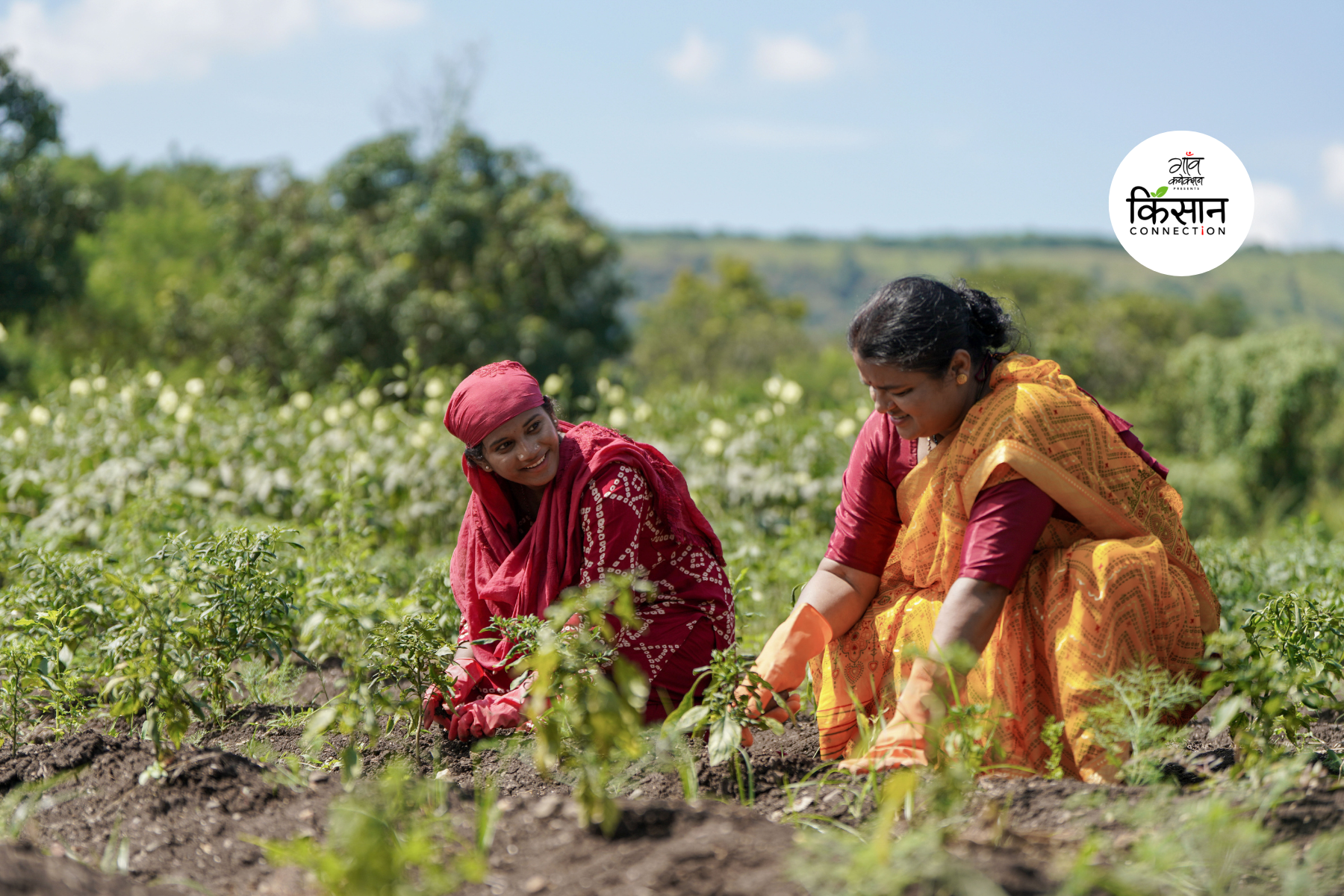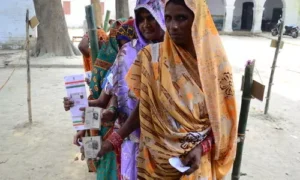Sumi Tudu had just finished Class 9 in her village in Odisha when she contracted malaria. Soon after, her father too fell severely ill. With no mother and only a married sister settled a few villages away, Sumi was forced to leave school to become her father’s primary care-giver and also manage household responsibilities.
Good Business Lab spoke to Sumi in 2017. She talked about how at the young age of 14 she worked hard from dawn to dusk cooking food, washing utensils, cleaning the house, and working in the fields all by herself.
“I wanted to study more. I didn’t have a plan or any big dreams like becoming a doctor, but I wanted to go to college. Hindi was my favourite subject — I was quite fond of Hindi poetry.”
Once her father’s work on the fields, their main source of income, dried up, Sumi felt compelled to financially support her home.
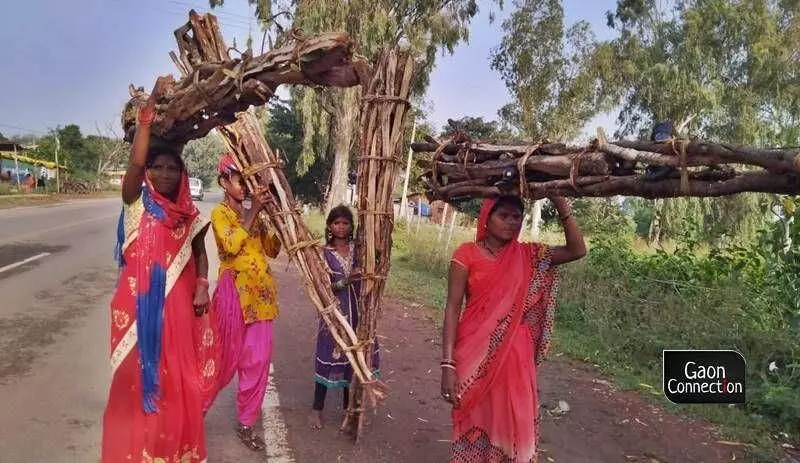
The estimated female labour force participation rate (FLPR) in India is a mere 19 per cent.
Although she no longer remembers the poems she once loved, this path has since imbued in her new aspirations. At the time of her interview, Sumi was 20 years old and employed as a garment worker in Bengaluru, Karnataka.
Also Read: Dung to diyas — it’s a cakewalk for rural women in Uttar Pradesh
But not every woman in India manages to find work. According to the World Bank’s 2021 report, the estimated female labour force participation rate (FLPR) in India is a mere 19 per cent. To compare the marked fall, the World Bank recorded a peak of 32 per cent in 2005.
Much has been written about the country’s alarmingly declining rate of women’s share in the labour market. Some point to the general lack of employment opportunities, a problem that becomes exacerbated for women whose jobs are first to be rendered redundant in times of economic crises.
Others argue that the measurement of women’s labour is itself inadequate. They point to the fact that many women engage in economically contributive labour practices within household and informal contexts that are not taken into account by data collection.
There are a plethora of reasons behind this abysmally low rate. But what becomes crucial to ask is whether there are structural hindrances to women not only entering India’s workforce but also continuing within it. We cannot address women’s absence from certain sectors in the labour market, especially in the rural arena, without addressing the gendered social context women encounter while working.
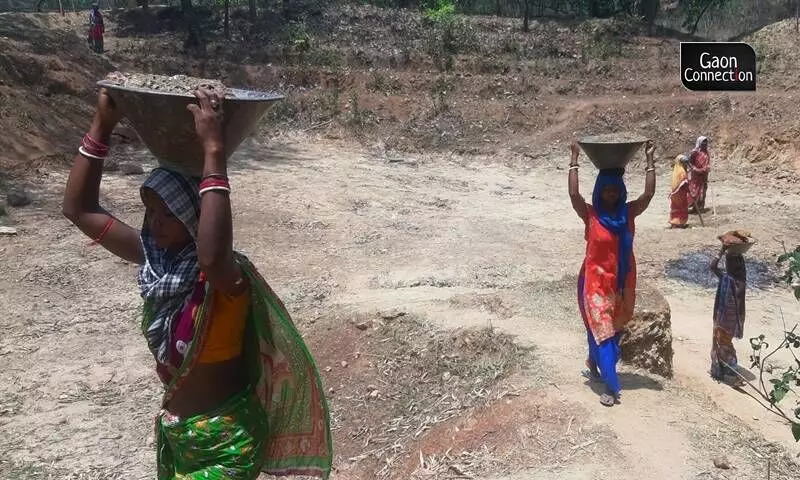
Mapping a woman’s social world and crafting interventions to holistically adapt her workplace to it is a positive way to ensure her economic mobility.
Typically, marginalised castes and communities (such as transgender communities) tend to have higher rates of labour participation due to sheer economic compulsion. Work is not necessarily a choice, but rather a means to survival.
Also Read: A mobile app provides rural women a platform to buy and sell livestock
According to India’s Labour Bureau report of 2015, rural women from OBC, SC, and ST groups had higher rates of employment (26.2 per cent, 29.2 per cent, 36.3 per cent, respectively) than rural women from other caste groups (21.1 per cent). The same was true of official rates for urban women which dropped considerably across all groups while retaining their skewed ratios.
Trans people in both rural and urban settings had a higher rate of employment. However, caution should be exercised when mistaking quantity with quality.
A 2019 study carried out by the United Nations Development Programme (UNDP) and their knowledge partners, found that within rural areas women from upper caste groups were more likely to be provided a written contract for their job.
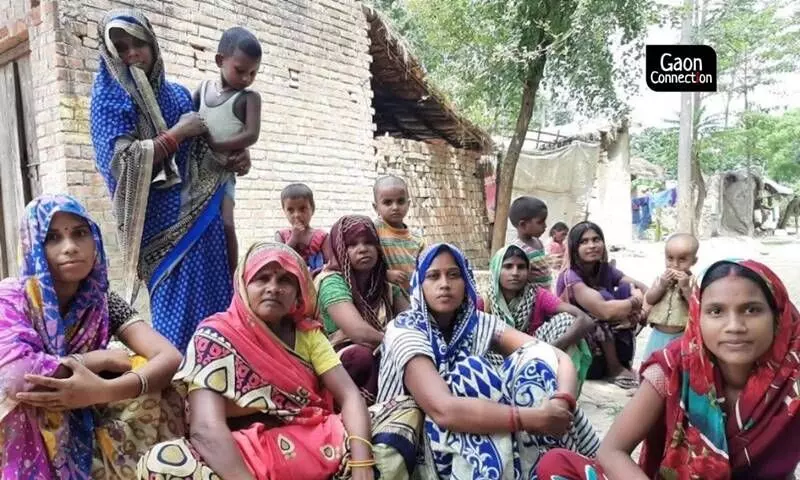
Typically, marginalised castes and communities (such as transgender communities) tend to have higher rates of labour participation due to sheer economic compulsion.
For instance, 36.4 per cent of rural upper caste women were given a written job contract that ranged from less than a year to more than three years. This number fell to 15.8 per cent and 15.5 per cent for women from ST and SC caste groups respectively.
A written contract can function as one measure of protection for women workers. It can enable the scarce routes to redressal for resolving workplace conflict.
Also Read: Jharkhand’s Sakhi Didis make eco-friendly rakhis, earn profit
The same UNDP study also found that while 43.5 per cent of upper caste Hindu women in rural India are eligible for paid leave, only 23.4 per cent of Muslim women in the same areas are eligible. What this shows is that while upper caste Hindu women constitute a smaller proportion of the female workforce, they tend to avail a marginally better working environment.
Regardless, there remain serious gaps within India’s labour supply and conditions for women across the board. Experts believe there is an urgent need to introduce strong support services at women’s workplaces with a special attention to historically disenfranchised groups.
The aforementioned UNDP study claimed that there are “few national policies [focusing on the provision of] support services lodging, safe and convenient travel, migration support and childcare” that would improve the experience of working for women. Policies like those would be far more effective in enabling their entry and retention into the workforce.
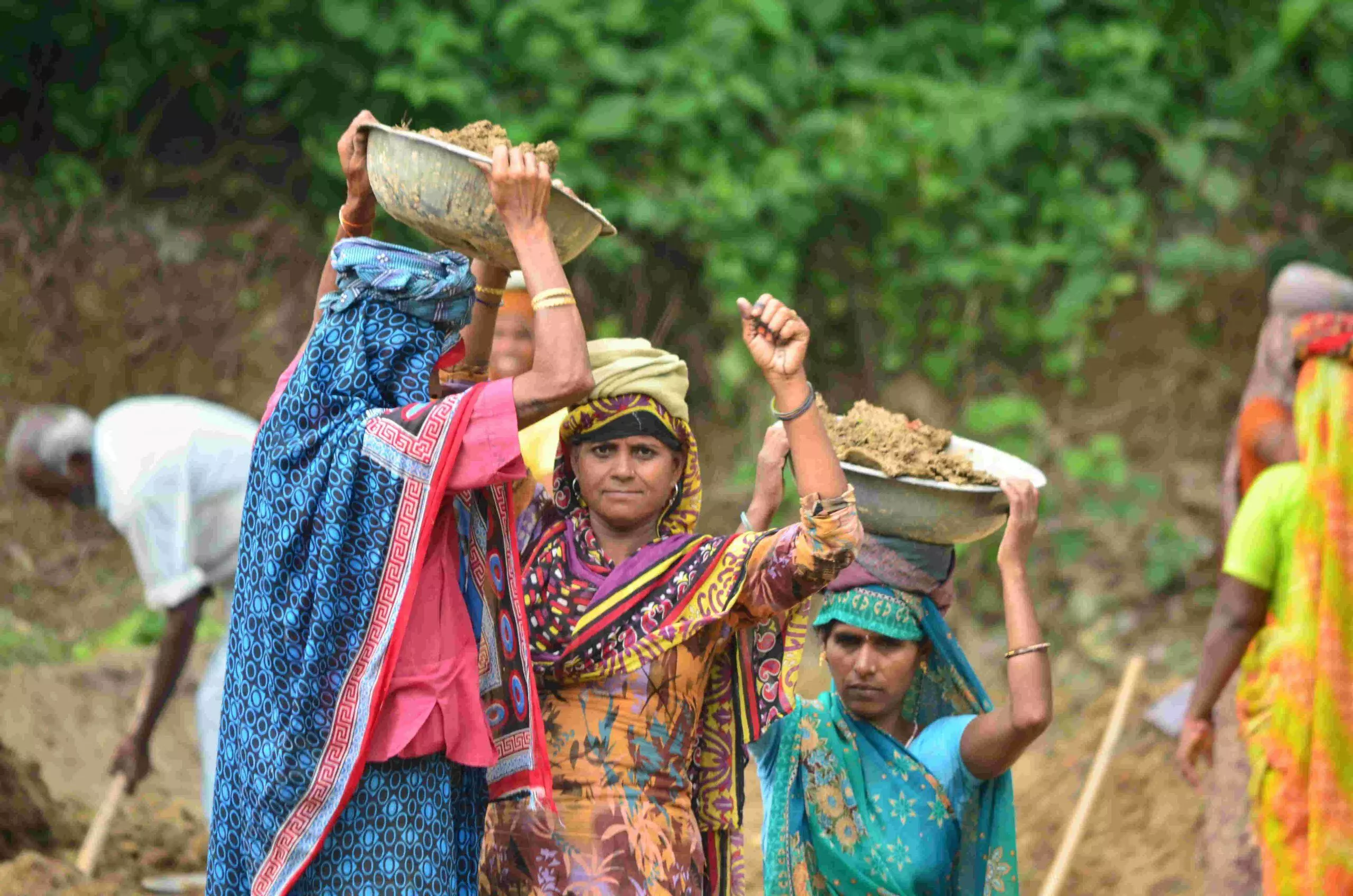
Perhaps the way towards ensuring women in India can enter the job market is to create material support relevant to them.
Mapping a woman’s social world and crafting interventions to holistically adapt her workplace to it is a positive way to ensure her economic mobility.
Sumi’s journey is indicative of that. In 2017, she entered a Rural Training Centre established by the Ministry of Rural Development’s Deen Dayal Upadhyay Grameen Kaushalya Yogna (DDU-GKY) programme with implementation support from garment manufacturer, Shahi Exports. As part of this partnership, Good Business Lab was brought on board to provide interventions, information, and influence geared towards worker wellbeing.
Also Read: Rural women add spice to their livelihoods
There is a serious lack of academic evidence for the return on investment that worker wellbeing programmes generate for businesses, especially in low-income settings. We approach our vision of improving the lives of workers across the world through bridging this gap and showing with data-informed research that such investments generate real returns.
We believe the business case for worker wellbeing goes beyond compliance, charity, and social responsibility. At a time when the global public discourse is focusing on workers with renewed awareness and urgency, Good Business Lab strives to reveal how better conditions for vulnerable workers ultimately benefit everyone.
Keeping this vision in mind, the Lab also provided support like migration assistance that alleviates the anxieties women like Sumi and their families may have about moving. Sumi herself had some doubts. Rural Training Centers affiliated with the garment sector have popped up across the country.
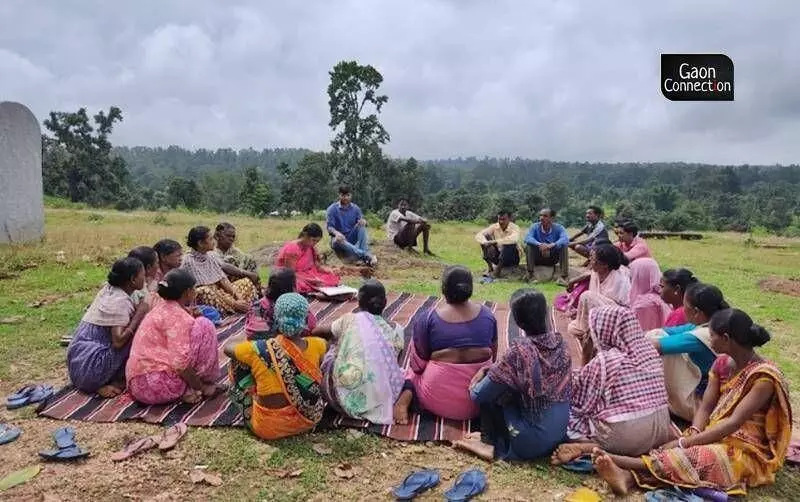
We cannot address women’s absence from certain sectors in the labour market, especially in the rural arena, without addressing the gendered social context women encounter while working.
However, a vast majority of them maintain a narrow scope including only technical skills, like that of tailoring. They ignore the importance of life skills important to women. Concerns specific to them, such as a lack of experience with independent living and others, are left out of the conversation.
Good Business Lab’s interventions, on the other hand, draw sharp focus to the complex world a woman in India inhabits. The decisions she gets to make, the decisions she has little agency to make, the structural problems she faces, and the gaps in her access to certain kinds of knowledge and practices (like financial literacy, technological capabilities, etc).
The Rural Training Centers women like Sumi were enrolled in were replete with sessions on money management, mental health workshops, negotiating lifestyle changes, and more. Potential workers received general supporting information along with their families.
More importantly, however, they also received sessions on autonomy with regards to their finances that were privy only to them and not shared with their family. Researchers say this can help minimise the control families may try to exert over a woman’s finances even after relocation.
“One of the most popular sessions was on time management,” said Roopika Nair, a Field Analyst at Good Business Lab associated with the Rural Training Center project in Karnataka.
Also Read: Mentha farmers in Uttar Pradesh learn how to double their income
For Roopika, this project is not only about a livelihood change for a woman’s family but also a social transformation within herself and her world. With women minimising their own capabilities and many in their life still thinking of them as a burden, the interventions provide an opportunity to change everyone’s perception.
Preetha Srinivasan, a Research Associate from Good Business Lab working on the Rural Training Centers project in Karnataka, said that they maintain an irregular schedule of check-up calls for women once they move to the city for work.
Even though pre-migration sessions include resource sharing for things like holidays calendar, salary breakups, welfare officer contacts, and more, many women tend to forget these by the time they move. These calls help brush up their knowledge around what resources are available for their wellbeing.
Perhaps the way towards ensuring women in India can enter the job market is to create material support relevant to them. Support not in a passive sense of simply holding them up, but through which they can actively thrive even if they encounter challenges. Sumi, too, agrees.
“It’s a little scary, yes. There are so many people and so many cars here. It’s always so loud. Everyone is a stranger- you can’t determine the character of the people here. I miss my father. But with every new day, I think I will feel better. I like the hostel I’m living in- everyone seems to be warm and helpful, and the best part is, I’m living with my friends who have been working here for a few years!”
Nihira is a Senior Communications Associate at Good Business Lab (GBL).


